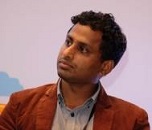Scientific Program

Pennan Chinnasamy
Indian Institute of Technology, India
Title: Need for holistic data for holistic climate change mitigation and adaptation
Biography:
Pennan Chinnasamy has a PhD in hydrology, from University of Missouri, US and is an Assistant Professor with Indian Institute of Technology, Bombay - India, under the Centre for Technology Alternatives for Rural Areas, where his work primarily focuses on natural resources assessment, monitoring and management in rural regions. He is the founding director of the Rural Data Research and Analysis (RuDRA) lab, which is the first Big data lab for rural regions, housed in an academic institution in India. Over the past decade, Pennan has experience working in NGOs, national and regional government agencies and academic institutions, focusing on sustainable surface and groundwater management plans, climate change impacts, large data analysis and hydrological simulation models. His work has been recognized in many internationally peer reviewed journals, policy briefs and government reports (e.g. EPA, NEA- Nepal, World Bank, Asian Development Bank).
Abstract
Statement of the Problem: In India there are many agencies that aim to aid sustainable development. Most of these agencies are federal or state government owned and are operated individually or under a specific ministry. Each agency, in order to formulate policies and rules, collect data and manages it. For example, a water resources department collects data on reservoir water levels, water demand and water supply for sustainably managing water supply schemes. Therefore, agencies are divided into themes/focus areas or departments and data is housed in each of these units individually.
Formulation of management/performance indices (e.g. drought index, flood index, unmet demand index) requires good observation data, and requires seamless/open access to data. It is therefore important to identify/develop frameworks that is sensitive to issues on data sharing, thereby creating unique pathways for collaboration towards a win-win scenario. On such scenario is the use of Big Data from remote-sensing platforms along with observed data for groundwater resources assessment. I used such frameworks for understanding, in India, the impact on groundwater due to increased agricultural productivity, pollution of groundwater, groundwater recharge due to canals, check dam performances and flood mitigation using Ganges aquifers. Under such scenarios, there is a need to identify big-data tools and methods that can be used to assess research gaps. In this presentation, potential methods to collect and collaborate data for rural management will be discussed.
- Earth Science and Hydrology
- Oceanography & Marine Geology
- Earth, Ecology and Ecosystems
- Mineralogy and Petrology
- Geosciences
- Agriculture and Bio resources
- Human/Environment Health
- GIS and Remote Sensing
- Environmental Sociology
- Global Warming & Biodiversity
- Pollution and Climate Change
- Atmospheric Sciences and Meteorology

